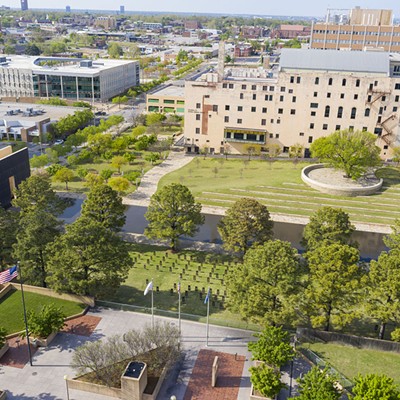
The empty chairs at the Oklahoma City National Memorial & Museum commemorate the 168 victims of the 1995 bombing of the Alfred P. Murrah Federal Building. But what about those who lived through it?
Aftermath study
Twenty years after the act, new research by Phebe Tucker, a University of Oklahoma Health Sciences Center psychiatrist, suggests that survivors fared far better emotionally than expected. In May, she presented the research at the American Psychiatric Association’s annual conference in Canada.
“[Survivors] have more symptoms of depression and anxiety,” she said. “About 20 to 25 percent ... surveyed still had signs of post-traumatic stress disorder (PTSD). But that means that about 75 percent did not.”
Tucker’s research surveyed 309 individuals from Oklahoma City. Approximately half — 138 people — lived. Of those, 80 percent were injured. Tucker started her research in 1996, and with 19 years of data, it represents the longest running study of post-traumatic stress ever.
Stress symptoms
The disorder can persist long after the ordeal that induced it. It includes vivid flashbacks, among other mental health issues. Changes in outlook also are common.
Negative feelings often evolve, sufferers lose interest in activities they once enjoyed and a deep sense of hopelessness materializes and people can experience difficulties creating and maintaining close relationships.
No clinical list of traits captures the horrors PTSD can generate. People often shut down and find themselves swimming in a sea of meaninglessness. But Tucker’s research indicates that many have made it to the other shore.
“We were trying to find out what are some of the emotional results of being highly exposed to a terrorism act, so we looked at ... mental health symptoms and found that they were higher than the controls,” she said. “We also wanted to know what kind of PTSD [traits] occur that far after [a terror event].”
Findings
The study uses a widely accepted emotional growth inventory to evaluate participants. It focuses on 10 categories of positive coping skills such as social support, spirituality and positive life changes. It targets positive emotional changes in people’s lives that stem from negative experiences.
Almost half of all survivors, for instance, now find that “people are wonderful.” Many report that they value life more. Researchers also learned that survivors are emotionally stronger than they thought. And a somewhat smaller percentage of participants changed their life priorities and became more spiritual.
Among the positive coping skills used by survivors, utilizing community support rated among the most successful.
“When [people] report that people are wonderful, they must have had some positive social support,” she said.
Paul Heath, who was a psychologist with the U.S. Department of Veterans Affairs at the time of the attack, was on the building’s fifth floor during the blast. Shortly after the disaster, he helped found the Oklahoma City Murrah Building Survivors’ group, which met regularly until last year. Heath still deals with nightmares about the attack.
“I worked with a lot of PTSD clients as the counseling psychologist at the VA. I knew we could get [survivors] to come together [and resolve] some basic things about PTSD by being able to talk about it,” Heath said. “We emphasized that if a person would talk about it, it would help some. Some people resisted that idea and didn’t want to talk about it. But for those that did, it seemed to help a lot.”
Tucker’s research also examined general health. Compared to those not exposed to the explosion, the survivors showed no higher incidences of high blood pressure, strokes, heart disease or cancer.
The research also relied on a registry of victims maintained by the Oklahoma State Department of Health (OSDH).
The database is used for a variety of fact-finding projects, and study samples for analysis on the long-term effects of terrorism have been identified from the records, said Tracy Wendling, an epidemiologist at OSDH.
“The resulting research has helped inform injury prevention, disaster preparedness, engineering and building design, emergency response and long-term outcomes of [acts of terror], including physical and mental health needs,” she said.
Tucker’s inspiration grew out of her 20-year psychiatric treatment of the survivors. More recent acts of terror, such as the World Trade Center bombing and 2013’s Boston Marathon explosion, also were motivators.
Tucker and her colleagues will follow up by analyzing the survey’s open-ended questions. Tucker hopes hearing people’s stories in their own words will yield further insight into how people deal with the anguish of terrorism.
“We’ve always known that people are resilient. What we didn’t know is that on a long-term basis, almost 19 years after the bombing, people reported that some positive growth came from that horrific experience,” she said.
Print Headline: Survivors, Twenty years later, new research indicates that survivors of the Oklahoma City bombing have recovered much better than expected.











